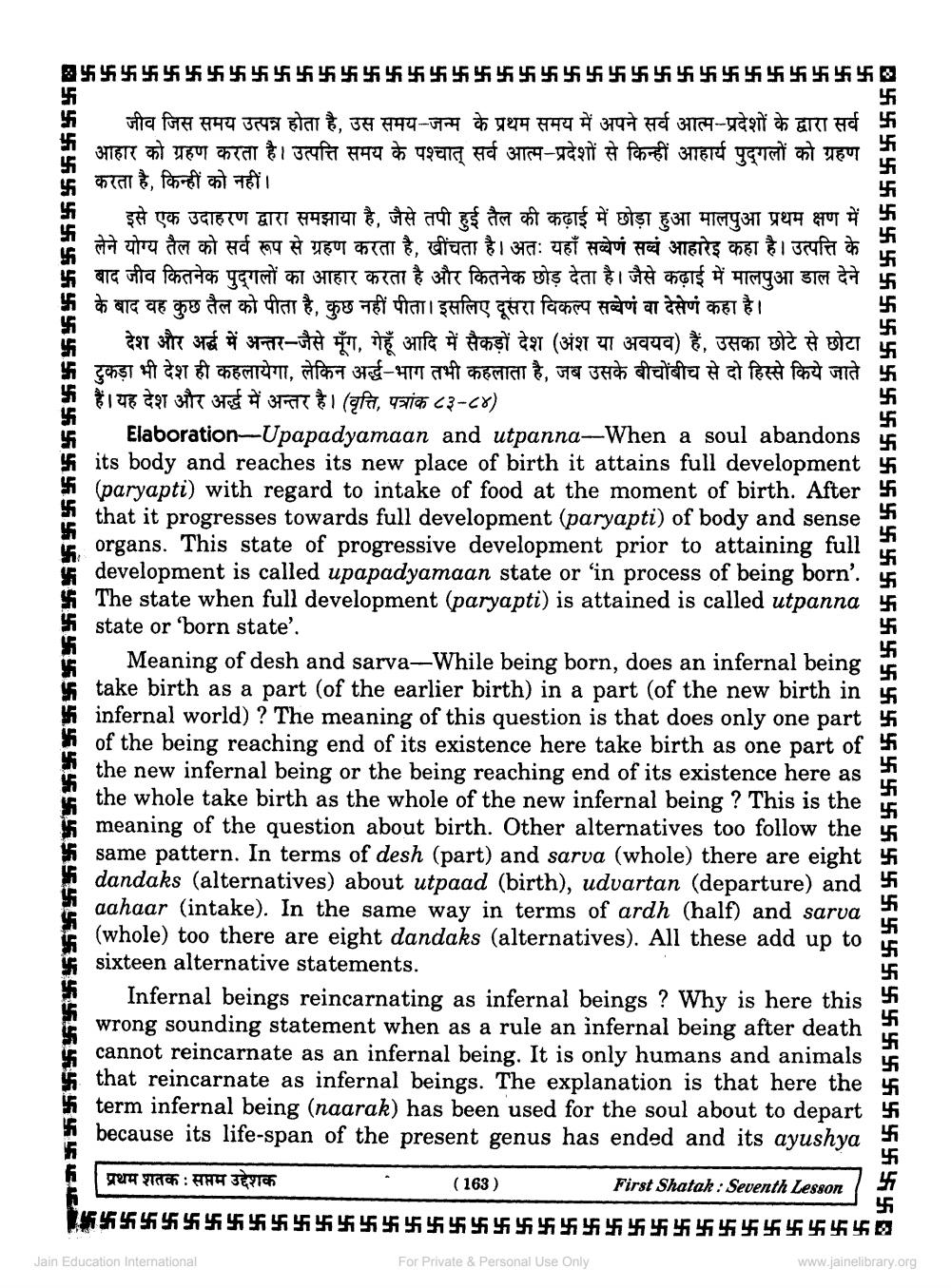________________
555555555555
5 555555555555
且听听听听$$$$$$$$$$$$$hhhhhhhhhhhh5折折折折乐乐乐乐折折折折折乐hhhh
जीव जिस समय उत्पन्न होता है, उस समय-जन्म के प्रथम समय में अपने सर्व आत्म-प्रदेशों के द्वारा सर्व आहार को ग्रहण करता है। उत्पत्ति समय के पश्चात् सर्व आत्म-प्रदेशों से किन्हीं आहार्य पुद्गलों को ग्रहण
करता है, किन्हीं को नहीं। 5 इसे एक उदाहरण द्वारा समझाया है, जैसे तपी हुई तैल की कढ़ाई में छोड़ा हुआ मालपुआ प्रथम क्षण में
लेने योग्य तैल को सर्व रूप से ग्रहण करता है, खींचता है। अतः यहाँ सव्वेणं सव्वं आहारेइ कहा है। उत्पत्ति के ॐ बाद जीव कितनेक पुद्गलों का आहार करता है और कितनेक छोड़ देता है। जैसे कढ़ाई में मालपुआ डाल देने के बाद वह कुछ तैल को पीता है, कुछ नहीं पीता। इसलिए दूसरा विकल्प सब्वेणं वा देसेणं कहा है।
देश और अर्द्ध में अन्तर-जैसे मूंग, गेहूँ आदि में सैकड़ों देश (अंश या अवयव) हैं, उसका छोटे से छोटा के टुकड़ा भी देश ही कहलायेगा, लेकिन अर्द्ध-भाग तभी कहलाता है, जब उसके बीचोंबीच से दो हिस्से किये जाते हैं। यह देश और अर्द्ध में अन्तर है। (वृत्ति, पत्रांक ८३-८४)
Elaboration papadyamaan and utpanna-When a soul abandons its body and reaches its new place of birth it attains full development (paryapti) with regard to intake of food at the moment of birth. After that it progresses towards full development (paryapti) of body and sense organs. This state of progressive development prior to attaining full
development is called upapadyamaan state or ‘in process of being born'. $ The state when full development (paryapti) is attained is called utpanna state or 'born state'.
Meaning of desh and sarva-While being born, does an infernal being take birth as a part (of the earlier birth) in a part (of the new birth in infernal world)? The meaning of this question is that does only one part of the being reaching end of its existence here take birth as one part of i the new infernal being or the being reaching end of its existence here as the whole take birth as the whole of the new infernal being ? This is the meaning of the question about birth. Other alternatives too follow the same pattern. In terms of desh (part) and sarva (whole) there are eight dandaks (alternatives) about utpaad (birth), udvartan (departure) and aahaar (intake). In the same way in terms of ardh (half) and sarva (whole) too there are eight dandaks (alternatives). All these add up sixteen alternative statements.
Infernal beings reincarnating as infernal beings ? Why is here this wrong sounding statement when as a rule an infernal being after death cannot reincarnate as an infernal being. It is only humans and animals that reincarnate as infernal beings. The explanation is that here the term infernal being (naarak) has been used for the soul about to depart because its life-span of the present genus has ended and its ayushya
&$$$$$$$ $$$$$$$$ $$$$$ $$$$$$$$$$ 55555555
| प्रथम शतक: सप्तम उद्देशक
(163)
First Shatak : Seventh Lesson |
5
555555)
)))))))
)))))))
)
Jain Education International
For Private & Personal Use Only
www.jainelibrary.org




